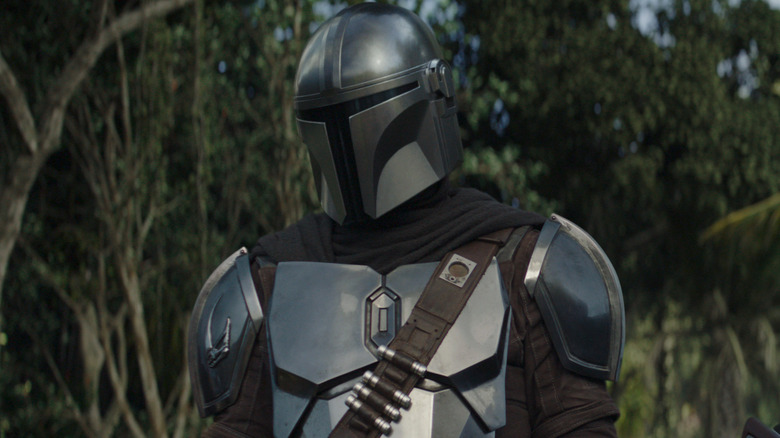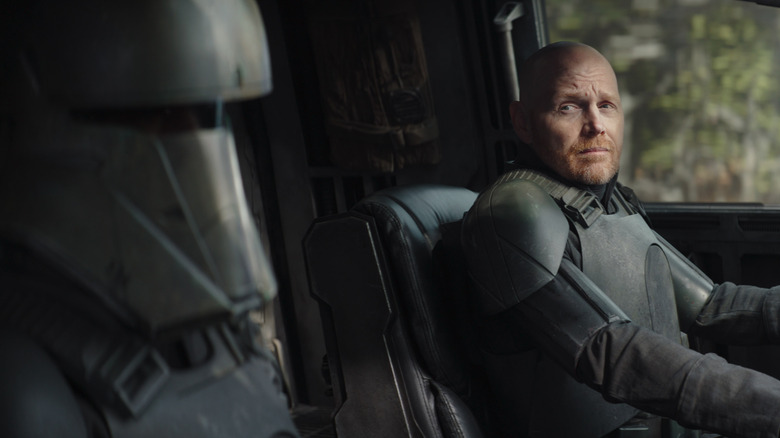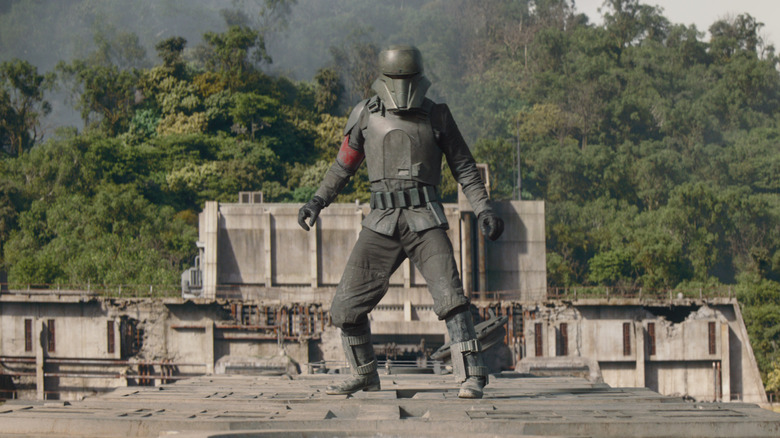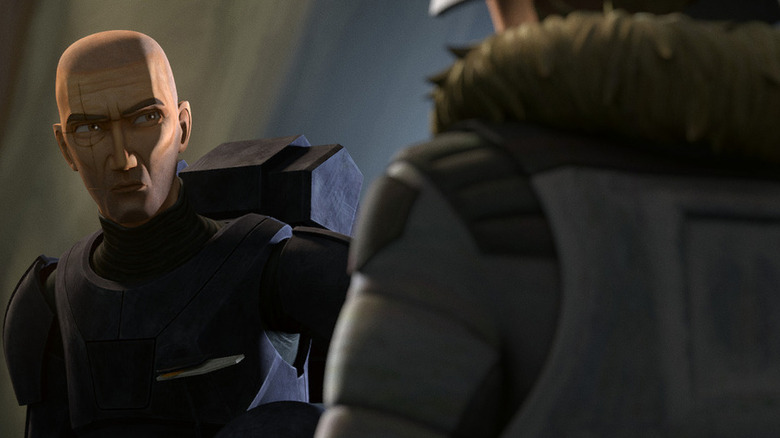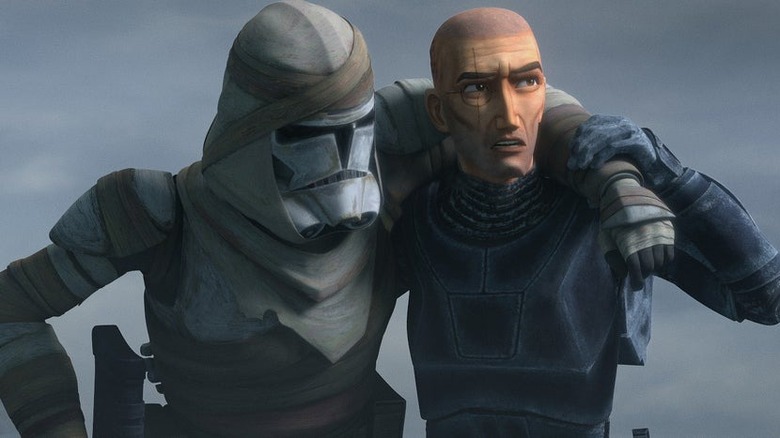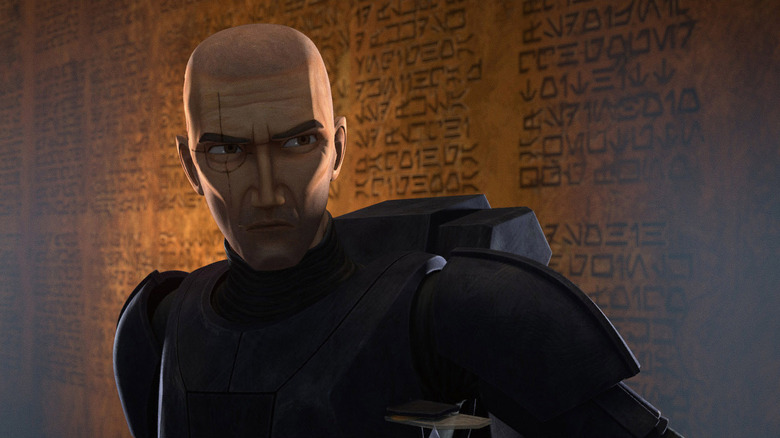The Bad Batch Season 2's Best Episode Unfortunately Veers Into A Mandalorian Controversy
This post contains spoilers for "The Mandalorian" and "The Bad Batch."
In one of the more introspective chapters of "The Mandalorian," the titular Din Djarin (Pedro Pascal) has to traverse uncomfortable territory in season 2, episode 7 "The Believer" (directed by Rick Famuyiwa). To infiltrate an Imperial refinery on the Imperial-occupied planet of Morak, the Mandalorian has to bend his Mandalorian Creed to don the Imperial armor and then play the role of a loyal Imperial underling in order to snag intel that could save the life of Grogu, his foundling. He and his accomplice Migs Mayfield (Bill Burr), a former stormtrooper, hijack a transport, and Din ends up getting into some fisticuffs with some humanoid Shydopps pirates atop the transports. Along the way, Mayfield also barrages Din with some philosophical and existential questions about the moral grays of the galaxy: the desperate lengths the otherwise pious Din would go to circumvent and contradict his Creed (to follow his own Creed to care for his foundling), civilians viewing both Empire and New Republic as invaders, and the limits of intervening in injustice. For Din, the ends have to justify the means.
The bantha in the room
And then we get to the big bantha in the room. Yes, the pirates snarled and lashed out at our favorite Mando, the devoted Dad much beloved by "Star Wars" fans. But for one, the pirates were concerned with attacking Imperials and Din Djarin was a bad-guy Imperial in their eyes. Interestingly, they don't attempt to steal the rhydonium cargo or the transport so they don't seem to covet any riches or profit. Rather, they plant detonators on the rhydonium, components in Imperial fuels, on the Imperial transports.
What if the "pirates" themselves were local insurgents fighting against the occupation of their homeland? What if they weren't just pirates but locals defending themselves and sabotaging Imperial oppression? That's one question that proved to be a head-scratcher or misgiving for many reviews and recaps.
It's nothing new that the Mandalorian is forced to punch out or blast some random alien or humanoid that ambushes him without any diplomacy (in contrast to his amiable working relationship with the Tusken Raiders). In fact, we also see Din scuffle with aggressive Amalites humanoids in the recent season 3, episode 2 "Mines of Mandalore." But "The Believer" attempts to grapple with morally gray actions and their consequences. After its fast-paced chase and high-octane combat aboard the transports, "The Believer" proceeds to not acknowledge the implications and treats the "pirates" like savage adversaries not worth any regard.
Aliens don't tend to be as humanized
Of note, when Din Djarin glances sympathetically at one of the planet's Morak locals (passively observing the Imperial transports), it's notably a human boy's face — because homo sapiens in science fiction or fantasy tend to be more relatable than those of "othered" extraterrestrial faces. Of course, there are always exceptions, but when it's an alien face, they're typically presented as an immediate red flag and a signal to attack.
"Star Wars" held that the best point of identification and reliability is often a human face. Any alien who is "othered" is far from conventional amiability in appearance. This favoritism of humans has not necessarily gone unacknowledged in the "Star Wars" universe itself. The "Star Wars Resistance" cartoon alluded to the Empire's specific oppression of humanoid aliens. In addition, "Andor" also subverted a trope of alien civilians acting as an obstacle to the human protagonists. So it feels more evident that "The Believer" gave its "aliens are monsters" trope a lot less thought. This brings us to a problem in another great piece (though perhaps underrated) of "Star Wars" media.
The Outpost
Recently, "The Outpost" (written by Jennifer Corbett) proves to be one of the best "The Bad Batch" episodes in all its wartime hopelessness and simmering outrage. Although the appearance of the Empire-loyalist sniper clone soldier Crosshair (voiced by Dee Bradley Baker) has been fleeting in season 2, his episodes are more willing to explore the darker territory in contrast to his estranged Bad Batch siblings. "The Outpost" finally pushes Crosshair's loyalty to the brink when he forges a quiet bond with the "reg" clone Mayday as they guard classified Empire cargo. Paired with composer Kevin Kiner's bone-chilling synths and an atmospheric direction by Nathaniel Villanueva and Brad Rau, "The Outpost" ends in a satisfactory catharsis.
Deep in an era where the Empire is throwing loyal clone soldiers under the bus in favor of conscripted humans, "The Outpost" effectively delves into the corrosive treatment of the marginalized clones. To the Imperials, clones are subhumans not worth pensions or civilian life. Furthermore, the frazzled but experienced Mayday has been requesting assistance and updated equipment for many rotations, only to be met with no answer — because clone soldiers are not worth the budget to the Empire. Crosshair and Mayday begin a rather begrudging working relationship but then they grow mutually respectful of their respective struggles, and their burgeoning partnership pushes Crosshair to a series-turning epiphany.
The limitations
"The Outpost" is excellent at carving deep into the consequences of the Empire's oppression, forcing soldiers like Mayday to turn to resourceful scrappy methods to survive the battlefield. Not to mention that Mayday has internalized his expendability.
So "The Outpost" ends up limiting itself by replicating the aforementioned shortcoming in "The Mandalorian." When the outpost is attacked by humanoid-like "raiders" in head wraps that cover their features, they're nothing more than just an adversary with little sense of their internal world. But unlike the case with Din Djarin and Mayfield, Mayday's dialogue refers to the raiders as "locals" without much thought. On paper, Mayday's general apathy for the welfare of locals makes plenty of sense. And he does get disturbed by the raiders leaving behind one of their own for dead, so he would evaluate them as unambiguously the "bad guys." Having been bred for the Republic's war against the Separatists (and then forced to serve the Empire), many clone soldiers possess a limited understanding of civilians, non-Republic civilians in particular, and "The Bad Batch" has explored Crosshair's estranged Bad Batch siblings developing a complex view of several intergalactic victims and survivors of the Empire's growing regime.
The plight of the clones
For a 28-minute episode, the viewer isn't given much space or pause to think about the head-wrapped "locals," nary an empathic shot. Crosshair and Mayday can only afford to think of their military assignment and their own mortality. The focus is granted to Crosshair and Mayday's revelation (that they have been guarding stormtrooper equipment that signifies the clones' uselessness to the Empire), Crosshair taking a risk for a reg clone, and Crosshair's first spurt of disobedience against the Empire.
Had "The Outpost" been able to work with this complexity and encouraged the viewers' awareness of the locals' plight (without even leaving the clones' headspace), it would have added dimension to both Mayday and Crosshair. A "good" and "likable" clone like Mayday (compared to Crosshair) can be oppressed but still also play the role of an oppressor. As for the more ruthless Crosshair, it would have underlined his grimy arc. Back in season 2, episode 3 "The Solitary Clone," he shoots down a planet's leader without remorse. "The Outpost" showcases Crosshair forgoing his loyalty, not out of righteousness and regret for his war crimes, but more for a (very human) self-interest. He now understands his own expendability through Mayday's death. It's less about the lives he took as much as it is about his lost purpose.
